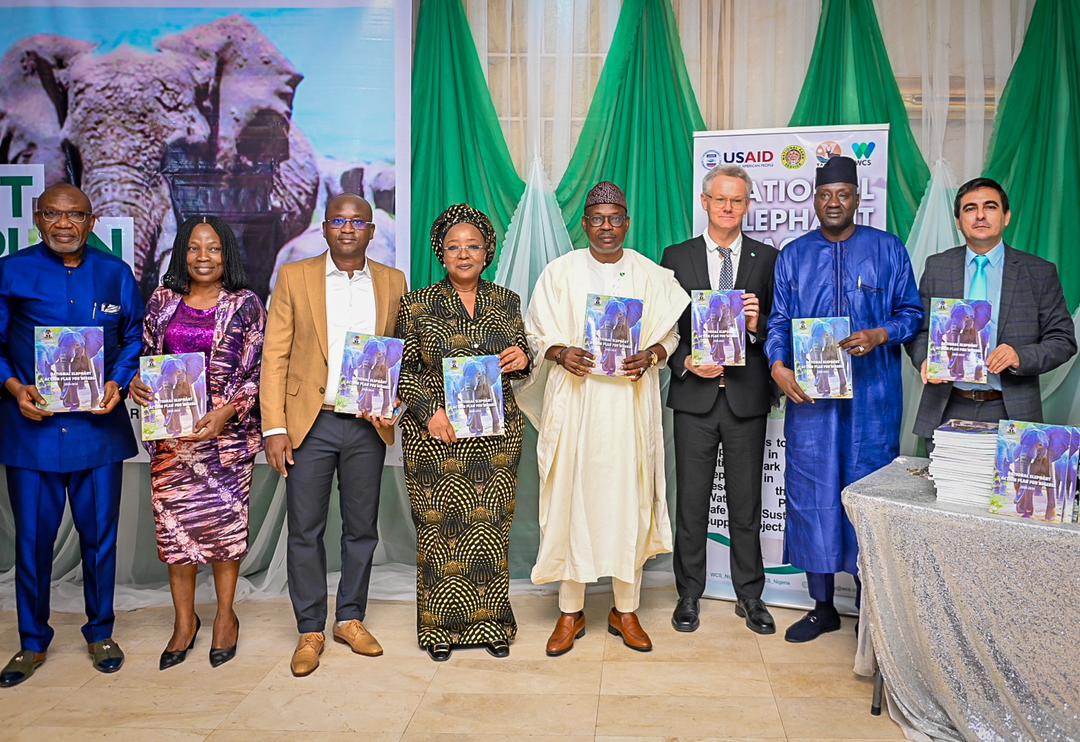
By Fatima Saka
The Federal Government of Nigeria has underscored the exceptional nature of elephants, citing their embodiment of qualities such as self-awareness, intelligence, and empathy that set them apart within the animal kingdom.
Acknowledging the increasing threat to biodiversity, particularly the iconic wildlife species like elephants, which is a growing concern in Nigeria.
The Minister of State for Environment, Dr. Iziaq Adekunle Adeboye Salako, during the inauguration of a Ten-Year National Elephant Action Plan for Nigeria (NEAP) on Tuesday, in Abuja. This initiative aligns with President Bola Ahmed Tinubu’s strategic agenda to harness natural resources for sustainable development.
The NEAP aims to establish a comprehensive framework for planning and overseeing elephant conservation efforts, guiding the strategies and decision-making processes of governmental bodies, donor agencies, and non-governmental organizations.
The Minister highlighted that the NEAP will offer a strategic blueprint for coordinating all stakeholders involved in elephant conservation and management, including government institutions, NGOs/INGOs, private sector collaborators, and local communities residing near elephant habitats.
In addition to domestic efforts, Nigeria is engaging in collaborative endeavors with neighboring countries at sub-regional and regional levels to combat wildlife and biodiversity depletion.
The Minister emphasized Nigeria’s leadership in the Ministerial Alliance for Ambition on Nature Finance (MAANF) and the recently established cooperation agreement with Cameroon on Transboundary Ecosystem Conservation and Sustainable Management of Forest and Wildlife Resources, aiming not only to enhance national security but also to bolster biodiversity conservation.
“Central to the NEAP is the involvement of local communities, essential for successful conservation endeavors. The government plans to work closely with communities to develop sustainable livelihoods and conservation carbon credit schemes, which can improve community well-being, mitigate detrimental activities affecting elephants and their habitats, and foster a collaborative conservation approach.
“The NEAP launch signifies more than a symbolic event; it serves as a clarion call to action for all sectors of society. It demonstrates the unwavering dedication of the government, led by President Bola Ahmed Tinubu GCFR, to safeguard and preserve the nation’s natural heritage. The Federal Ministry of Environment, in collaboration with partner agencies, remains resolute in combating poaching and illegal wildlife trade, particularly concerning elephants.”
During his remarks, the Permanent Secretary of the Federal Ministry of Environment, Mahmud Adam Kambari, expressed gratitude to the Wildlife Conservation Society (WCS) and the Wild Africa Fund (WAF) for their instrumental roles in developing the NEAP document. Kambari stressed that the responsibility of ensuring the survival and prosperity of Nigeria’s elephants for future generations extends beyond governmental entities to encompass society as a whole.
Speaking on the occasion, Chief Sharon Ikeazor, Chairperson of the Elephant Protection Initiative (EPI) Leadership Council and former Minister of State for Environment, highlighted Nigeria’s unique position as one of the few African countries hosting both forest and savanna elephants, lamenting the significant decline in their populations.
However, Sharon urges all stakeholders to recommit to the cause of elephant conservation and commended the efforts of the Minister of Environment, Balarabe Abbas Lawal, Minister of State for Environment, Dr. Iziaq Adekunle Salako, the Department of Forestry, and the Head of CITES for their dedication to biodiversity conservation.



